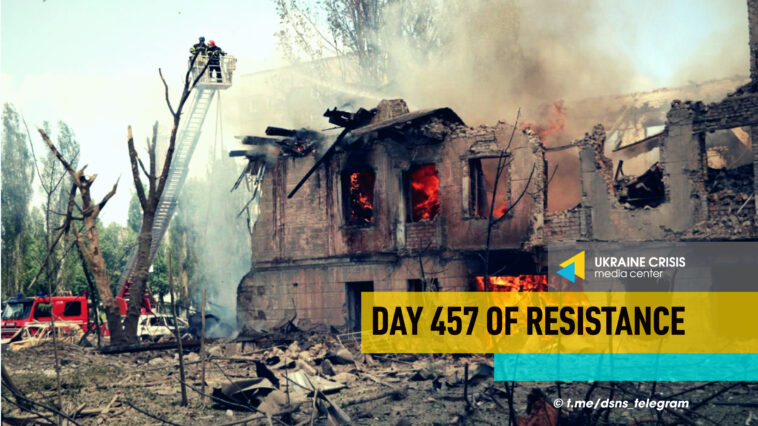A Russian missile strike on Dnipro hit a medical facility and a vet clinic, killing two and injuring children.
On the night of Friday, May 26, Russia launched 17 missiles of different types and 31 attack drones into Ukraine. Ukrainian air defenses shot down 10 cruise missiles and 23 Iranian-made Shahed drones.
This time, Russia mostly targeted the east of the country, aiming at critical infrastructure facilities and military sites, Ukraine’s Air Force Command said.
Russia fired 10 Kh-101/Kh-555 cruise missiles from Tu-95MS aircraft over the Caspian Sea, seven ground-launched S-300/S-400 guided missiles from near occupied Tokmak in Zaporizhzhia region, and 31 Shahed-136/131 attack drones from the south and north, Ukrainian Air Force Command reported.
Ukraine’s air defenses shot down 10 Kh-101/Kh-555 air-launched cruise missiles, 23 attack drones Shahed-136/131, and two operational tactical drones Orlan-10 and Merlin-VR.
Russian missile strike on Dnipro hits medical facility, vet clinic, killing two, injuring children
A Russian missile strike hit the city of Dnipro at around 10:35 a.m. during an air raid alert, head of the Dnipropetrovska regional military administration Serhiy Lysak said.
Russian forces struck a medical facility and a veterinary clinic in Dnipro. At least two people were killed, and 23 others injured. “Twenty-one people are in hospital, and three of them are in critical condition,” Lysak said.
A 69-year-old man was killed while “just passing by when the rocket struck the city,” Lysak said. The body of another man was pulled out of the rubble of a veterinary clinic building.
Among the wounded were two children — boys ages three and six. They are in hospital in serious condition.
The missile strike set ablaze a three-story medical facility and a nearby house, the State Emergency Service said. The medical facility was damaged, it added.
Netherlands may send F-16s to Ukraine after pilot training, Bloomberg says
The Netherlands will likely send F-16 fighter jets to Ukraine after pilot training, Bloomberg said, citing two people familiar with the matter.
The Dutch government has been spearheading discussions with US officials in the past weeks to press President Joe Biden’s administration to give a green light to delivering the aircraft, the people said, speaking on condition of anonymity.
The Dutch government is already looking into and discussing with its allies possible deployment plans [to prepare the pilots], one of the people said.
Despite the willingness of the Dutch government to help beef up Ukrainian air defenses “as soon as possible,” pilot training and mapping out deployment and logistics could take many months.
The Netherlands currently has 42 F-16 fighter jets in its inventory, 24 of which are currently being used by the Dutch army and cannot be sent to Ukraine until mid-2024. A dozen of the other 18 jets were to be sold to Draken International but the government delayed the transfer of the aircraft in December without disclosing an explanation, citing commercial confidentiality.
Ukraine may get some of the jets that are on sale or some of the currently operational 24 jets next year depending on the training timeline, the people, quoted by Bloomberg, said.
The prospects of Ukraine’s membership in NATO. Ukraine in Flames #442
None of the NATO member countries questions the fact that Ukraine should join the ranks of the Alliance. Questions, problems and discussions begin on when and how exactly this will happen. And here, let’s be honest, not all countries in the Alliance support Ukraine’s accession to NATO at the current stage in the state of war. At the same time, there is a group of countries that supports the position that even war cannot stand in the way of Ukraine’s invitation to NATO. Watch Ukraine in flames #442 to find out about the prospects of Ukraine’s membership in NATO and the balance of support for Ukraine on the eve of the Vilnius summit.
Guests:
- Archil Tsintsadze, Security Policy Expert
- Valeriy Chaly, Ambassador of Ukraine to the USA (2015-2019), Chairman of the Board of Ukraine Crisis Media Center
- Ihor Seletskyi, Executive Director of NGO “Euroatlantic Course”
- Volodymyr Tsybulko, Political Expert

